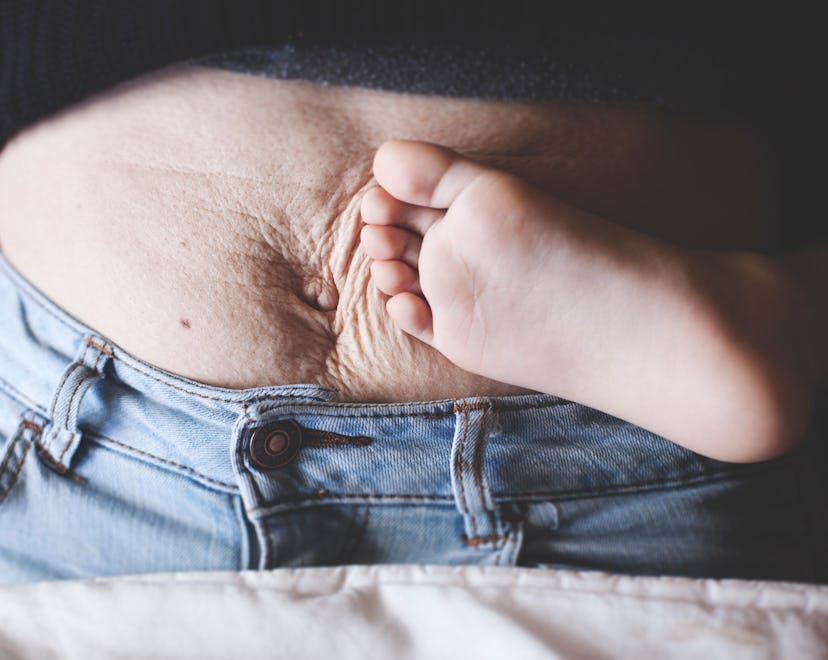Postpartum Health

Here's The Deal With Postpartum Body Odor (& How To Treat It)
Your funky smell is a breadcrumb trail for your baby.
As you probably remember from the sour smell of middle school gym class, hormones can affect body odor, making it more pronounced. You may notice that your sweat smells a bit more noticeable when you have your period, and after you have a baby, you may smell, well, let’s say a bit funkier than usual. Postpartum body odor is normal (and it happens for a pretty cool reason) but that doesn’t mean you have to love it. Here Romper spoke with three OB/GYNs about the causes of postpartum body odor, and how you can keep it at bay.
What causes postpartum body odor?
In the days and months after giving birth, you may notice that you’re perspiring more than usual, and that the postpartum sweat smells more potent. While this can understandably be annoying, rest assured that it’s happening for a good reason. A change in mother’s scent occurs to “help neonates as they cannot open their eyes and this helps create a positive orientation and direct the coordinated action for feeding,” Dr. Jessica Shepherd, MD, OB/GYN, Chief Medical Officer of Verywell Health tells Romper.
Basically your funky smell is directing your child to your breast (ew, but cool). “During breastfeeding, mothers excrete different pheromones and can act as a way of communicating with the newborn. There is also the infant's saliva that adds to this odor as well,” Dr. Shepherd adds.
Just as in puberty, hormonal shifts can also cause BO. “If there is any change in the body odor postpartum, this can be caused by the hormonal changes that occur after delivery,” Dr. Gunvor Ekman Ordeberg, OB/GYN, co-founder of DeoDoc Intimate Skincare, tells Romper.
You also may be sweating more than usual because the body loses so much water after birth, and perspiration is one of the ways the body lets go of excess fluids. "Your body increases its blood volume by 160% during pregnancy for the placenta and baby's circulation," physician Dr. Aditi Gupta. Jha told Romper in a previous article. "After delivery, this volume needs to return back to its original state and one way is to lose water in the form of sweating."
Plus, you’re probably not showering as much as usual, and you may be encountering spit-up and other scents you’re not used to. Discharge and bleeding and all of these other fun postpartum bodily fluids can also contribute to postpartum body odor. “Vaginal scent may change due changes in the pH, old blood in the vagina from lochia, moisture, and vaginitis due to hormonal fluctuations,” Dr. Kecia Gaither, MD, MPH, FACOG, double board-certified in OB/GYN and Maternal Fetal Medicine tells Romper.
How can I make postpartum body odor less noticeable?
Yes your body odor can help your baby find your nipple, but that doesn’t mean you want to smell constantly in the fourth trimester. While the advice to shower more often may seem laughable (if not rage-inducing) to new parents, the three experts are in agreement that this is the best way to keep postpartum body odor under control. If you don’t have time or energy for a full shower, wiping off the underarms and vagina with a warm washcloth or even a makeup cloth can help remove sweat, breast milk, discharge or blood.
Hydration is key for many reasons, but it turns out it also helps body odor. “Hydration is important to help rid of postpartum body odor. Water flushes out toxins and wastes while diluting the odors produced from your body,” Dr. Shepherd says.
Breathable materials (like cotton underwear or t-shirts) can help the body breath, so sweat doesn’t get trapped. And, of course, wearing deodorant will help keep your armpits smelling clean, but you may want to switch to a natural deodorant especially during the postpartum period (some natural brands like Papr, Brigeo, or Hatch really do work, I promise). “The underarm area is quite close to the breasts, increasing the risk of the infant coming in contact with skin covered by deodorant,” Dr. Gaither says. “Substances placed on the skin can be absorbed by the body and excreted in breastmilk. Some deodorants contain chemicals like phthalate or parabens which have been noted to be endocrine disruptors. As such, suggestions are given to breastfeeding mothers to switch to plant-based natural deodorants.”
Is lochia supposed to smell bad?
Lochia, which Dr. Shepherd describes as a mix of amniotic fluid, tissue and blood, usually passes vaginally for as long as six weeks after childbirth. The blend of stale blood and discharge from the uterus has its own scent and as you may expect, it’s not particularly pleasant. You may notice the smell of lochia (Dr. Gaither says it smells metallic) though an actual foul or fishy odor from the vagina is something you’ll want to check-in with your doctor about, as it could be a sign of infection.
Don’t forget that your sense of smell is strong during pregnancy, and it can continue in the postpartum period, which means you may be more sensitive to your smell than anyone else. And at the very least, your baby is a fan.
This article was originally published on